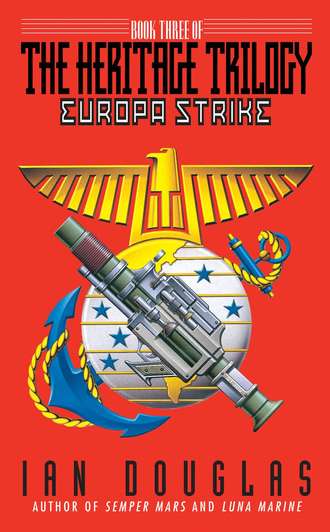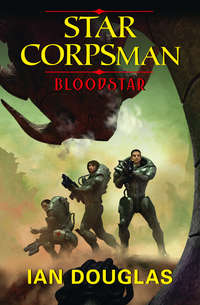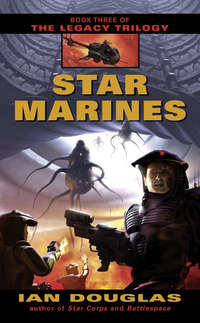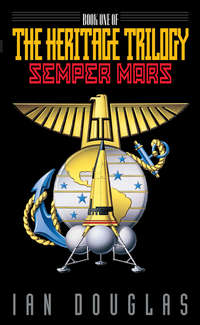
Полная версия
Europa Strike
“That’s screwed him,” Carver said. “I’ve just interrupted the BG-laser link with our own hull. The target is dropping into wait-and-see mode.”
“That means it will circle,” Mark told Jeff, “trying to reacquire the comlink beam.”
“It means,” Carver added, “that for the next few seconds, it will be predictable.”
“Martin 1150.” Mark tapped the screen showing the rotating schematic. “Pretty stupid, actually. No AI. No anticipation. It needs a human remote-driver to do damn near anything at all.”
Jeff still couldn’t see the other sub, but the Manta was falling now. A moment later, there was a sharp, hollow-sounding clunk from port, transmitted through the hull from the Manta’s left wing. “Got him!” Carver said, bringing the Manta’s nose high once more. “He’s going down, boss. Crushed his starboard flotation tank.”
“Good job.”
“Do you and the Atlantis seaquarium often take out one another’s subs?” Jeff asked.
“These are restricted waters,” Mark pointed out. “Part of AUTEC’s test range. If Atlantis loses a few of their touristride drones, maybe they’ll be more careful about keeping track of where they’re at. It’s not like GPS receivers are expensive or anything.”
“But you think it might’ve been the Chinese actually piloting it.”
“Almost certainly,” Mark said. “They tried getting in here first with drones off one of their big nuke subs, but the Navy chased them off. Lately, we think they’re using the commercial teleops to keep an eye on us.”
“Why? The Manta is new, but there’s no radical technology, no antimatter, no ET stuff. What’s their interest?”
“That,” Mark said, “is an excellent question. I wish I knew the answer.” He glanced at Jeff again. “It could be they know something about Icebreaker.”
“That’s not good.”
“No, Major, I wouldn’t think it was.”
“I’ve sent a message to the surface,” Carver said. “They’ll send a salvage boat down to collect the BGL relays. I doubt they’ll be able to collect the wreckage, though. Depth’s almost three thousand meters here. Pretty steep for the salvage boys.”
“They wouldn’t learn anything from a damned commercial drone anyway,” Mark replied. “We’ll have Intelligence check out the user logs at Atlantic, but whatever they find’ll be a front anyway. S’okay. I doubt that they saw anything worthwhile.”
“‘Grains of sand,’” Carver said.
“I know.”
“What’s that mean?” Jeff asked.
“Chinese intelligence services work somewhat differently than we’re used to here in the West,” Mark replied. “They operate on a philosophy as old as Sun Tzu’s Art of War, and they can be incredibly patient. They don’t rely on spies or moles or intelligence coups as much as they do on many thousands of discrete, tiny, apparently unrelated bits of information all being funneled back to Beijing by Chinese tourists, government workers, scientists, businessmen. The image is of millions of termites, each with a grain of sand, patiently building a mound two or three meters high.”
“Hell, sir, I thought all spy work was like that,” Jeff said. He’d spent three years of his Marine career working a desk for Marine J2 in the Pentagon and knew something about military intelligence. “Forget the cloak-and-dagger stuff. You piece together a fact here, a probability there, a statistic, a photograph…and you end up with a detailed report on why the Uzbek Republic is going to have a civil war next year.”
“Sure, but the way we go about it is a pale, pale shadow of how the Chinese do things. Intelligence operations in the West tend to go from fiscal year to fiscal year and extend just as far as the current budget allows. For the Chinese, doing something, doing anything with an eye to the future is standard procedure. They can afford to take the long view and make decisions that won’t bear fruit for twenty years.”
“I’ve heard stories about that,” Jeff admitted. “When they targeted our nuclear weapons program back in the last century, they did it a little bit at a time. But they did have a lot of help from greedy politicians and short-sighted bureaucrats.”
“They are…opportunists,” Mark said. “Opportunists with a very clear idea of where they want to go and how they need to go about it. And the patience to get there.”
Forty minutes later, the Manta broke the surface, exploding into dazzling, tropical sunshine and riding a gentle swell. A kilometer ahead, a Navy subcarrier was just visible, her black, stealth-canted upper deck, sensor suite, and aft housing rising from a main deck that was completely awash, completely bare of masts, railings, or other radar-catching protuberances. A lot of the newer Navy warships looked more to Jeff’s eye like the original U.S.S. Monitor than a modern surface vessel. Most attack vessels had even less visible above the waterline than the subcarrier Neried.
Though the Neried could launch and recover her submersible offspring underwater, the Manta was still undergoing sea trials and was scheduled this day for a surface docking. The subcarrier was broader than she looked in profile, with dual catamaran keels embracing a central wet-bay facing aft. Carver brought the sub about to line her up with Neried’s stern, slowly guiding the DSV “up her ass,” between the big ship’s keel-mounted MHD propulsors.
Mark slithered backward off his couch and stood behind Carver’s position. A touch of a button opened the Manta’s hood, exposing her topside bubble canopy and allowing sunlight to flood the cramped space with light and warmth. The space directly under the navigation bubble was the only spot on the bridge where a tall man could stand upright.
Jeff stayed where he was, however. He was fine underwater, but once the Manta reached the surface, the boat became ungainly, wallowing heavily with each swell despite the broad reach of her wings. He felt the first sharp twinge in his stomach and throat.
A fine thing, he thought, both angry and bemused by the weakness. He swallowed hard and clung to the padding of his couch, trying to shut out the lateral shift and yaw. A seasick Marine.
He’d been violently ill his first time afloat, back at the Naval Academy during small boat evolutions. It had been all the worse because Jeff Warhurst was the son of a Marine officer, the grandson of an officer and former U.S. Marine Commandant, the great-grandson of a Marine who’d won the Medal of Honor in Vietnam.
And that Marine’s father had been a Marine as well, a gunnery sergeant who’d watched the raising of the flag over Suribachi and five years later had frozen to death at a miserably desolate place called Yudam-ni.
All those Marine ancestors. And he got sick in small boats.
He didn’t suffer long, however. Carver guided the DSV into Neried’s wetbay, a wide, low-roofed cavern that closed off astern of them once they entered. A docking crew on the walkways to either side jumped aboard and secured lines to her retractable deck cleats. Her wings folded up, like the wings of an aircraft aboard a Navy strike carrier, as the working party hauled her by hand into a berth nestled alongside three identical craft.
Carver released her dorsal hatch, and a few moments later, Jeff was clambering up the ramp, onto the brow, and out into the relatively open space of the subcarrier’s wet-bay.
Captain Matheson, Neried’s CO, and Marine Colonel Haworth were waiting for the three as they stepped onto the walkway. “Permission to come on board,” Mark said.
“Granted, granted,” Matheson replied, grinning. “How’d it go?”
“Well, except for our unauthorized intruder, fine,” Mark said. “That’s quite a boat you people have there.”
“Come on up to the plot room,” Haworth said. “We’ll talk. The general will be here in a few minutes.” He glanced at Jeff. “What’s the matter, Warhurst? You’re looking a mite green.”
The lighting in the wetbay was poor enough that the colonel couldn’t possibly have noticed the color of Jeff’s skin, so the comment had to be a joke. It hit near enough the mark, however, that Jeff suppressed a wince. “Squared away and shipshape, sir.”
“I’m relieved to hear it.”
In fact, the large ship, with her broad, outrigger construction, was remarkably steady even in rough seas, so he no longer felt the pronounced roll of the ocean’s swell. By the time he’d followed the other officers up a level to the O1 deck and forward to the plot room, he was feeling somewhat better. A crushed ice machine in the wardroom along the way provided him with something cold and wet to hold in his mouth and thin his rising gorge.
General Altman arrived less than ten minutes later. They watched the approach of his UV-20 Condor on one of the plot room’s PLAT cam monitors as it swung in over Neried’s landing pad, hovered a moment on furiously howling tilt-jets, then lowered itself to a gentle touchdown. Altman and three members of his staff disembarked from the craft and were led below through a deck hatch, as a team of sailors rolled the aircraft forward into the upper deck hangar, one of the few above-deck structures on the carrier.
“I don’t know whether to be honored or terrified,” Jeff observed. “Generals don’t usually give briefings. And they sure as hell don’t fly out to meet you. They make you come to them.”
“Altman’s a decent guy,” Mark said. “He’s a rifleman.”
Jeff chuckled. In the Corps, it was said that every Marine—whether recruit or general, computer maven or tank driver or pilot or cook—was an infantryman, a rifleman, first. As with all aphorisms, there was some truth in the saying—as well as some wishful thinking. The every-Marine-a-rifleman concept sounded fine, but as with any large organization, the idealism tended to be lost after a while within the accretions of bureaucracy and daily routine.
But the saying was a popular one, and high praise indeed for a general.
“It is possible,” General Altman told them, an hour later, “that Icebreaker has been compromised. Two days ago, the Chinese government formally filed a protest with our embassy in Beijing, demanding that we stop all attempts to recover ET artifacts on or in Europa, pending the arrival of a PRC transport.”
Altman was a big, bluff man, a twenty-eight-year veteran of the Corps who’d won the Silver Star at Vladivostok and the Navy Cross and Purple Heart in the Cuban Incursion in ’50. An African American, he rejected all labels or political euphemisms as they applied to race; if the subject ever came up, he referred to himself only as a “dark-green Marine.” He had a reputation for bluntness—and for being willing to talk to his men and hear their gripes.
They were seated around an electronic table in the plot room, using the big, flat-screen computer monitor on one bulkhead to display graphics. One of the general’s aides had used his PAD to link into the room’s computer and put up a blurry vid-image of a spacecraft, obviously shot at extremely long range. It was a typical A-M drive ship design, a long, central spine with multiple reaction mass tanks, a heavily shielded drive unit aft with enormous heat radiator fins, a complex arrangement of slowly turning spin-gravity modules forward for the crew. Smaller craft, dwarfed by their huge consort, drifted in her shadow.
“Reconnaissance drones and tracking satellites have been keeping an eye on their two A-M drive ships in geosynch,” Altman went on. “The Xing Feng and the Xing Shan. They appear to be making preparations to get under way. In the past two weeks, cargo and manned launches from Xichang have gone from one a week to one or two a day. They also appear to be loading supplies aboard the research vessel Tiantan Shandian. Everything seems to indicate the Chinese are taking a much stronger interest in their political and military presence in space. Coupled with their ultimatum yesterday, their activities in space are taking on something of a sinister connotation.”
Jeff looked up from his own PAD, where he’d been studying the Chinese ship in detail. “Question, sir?”
“Go ahead, Major.”
“Why would Beijing be so hot about space now? They’re still recovering from their war.”
And it had been a nasty war, at that. Greater China had split into North and South after their civil war earlier in the century, with Tibet going her own and independent way. North China had fought on the European side during the UN War, mostly in the hope of settling old claims to parts of Siberia and Russia’s East Maritime Provinces, while Canton had sat the war out as a watchful neutral. Stopped cold at Vladivostok, she’d refused to sign the Treaty of London, but she’d also pulled her forces back behind the Amur. Within fifteen years, North China had invaded the south. The fighting had been vicious and fratricidal, including chemical and biological weaponry, though no nukes, thank God. The war had lasted twelve years and cost an estimated one and a quarter billion lives and uncounted trillions of yuan in damage. Since most of the fighting had been fought with Maoist guerrilla tactics, there’d been relatively few major battles in all that time, but vast parts of the South, especially, had been completely wrecked, and several major cities, including both Shanghai and the South China capital of Kuangchou, were now uninhabitable ruins.
General Altman considered Jeff’s question for a moment. “A good question, son. There are two answers, really. The first is that a fight with outsiders will make the job of politically unifying the country easier. The people are always willing to tighten their belts and endure privation if they’re faced with an outsiders-versus-us crisis.”
“Ah, xenophobia,” Mark said from his side of the table. “The glue that binds us together…against ‘them.’”
“The second is more critical to Beijing’s leaders, though,” Altman went on. “They’re afraid we’re going to grab all the juicy e-tech for ourselves.”
E-tech, originally “ET-tech” or “altech,” was the term now applied to the new technologies flowing to Earth from the alien ruins on Mars and the Moon. New materials, new manufacturing processes, a hint that nanotechnology might be possible after all, the possibility of new power sources…the practical benefits were only just beginning to emerge from the xenoarcheological digs.
“So…just like the UN War,” Jeff said. He glanced at Mark. That fighting, precipitated by a UN attempt to stop the United States and Russia from opening the ancient alien ruins on Mars, had led directly to Garroway’s March and the Battle of Cydonia.
“In simplistic terms, yes,” Altman’s senior aide, a lieutenant colonel named Montoya, said. “What we’ve found on Europa might well prove to be the key to all of the other ET discoveries we’ve made. Something is down there beneath the ice and still operating, possibly after half a million years. It may help us make sense out of everything we’ve learned—about ancient humans living on Mars, the An enslavement, the Hunters of the Dawn, all of it. And the promise of new technologies, my God! Most of what we’ve been able to recover so far have been bits and pieces and scraps. Some of the stuff from the underground complex in Cydonia is still operating, of course, but we haven’t figured out how to read the Builders’ records yet. And the An base we found at Tsiolkovsky is still almost a complete mystery. It’s going to take decades, maybe centuries, to learn the languages well enough to know what we’re looking at. Unless, of course, the Singer can give us some clues.”
“The Chinese are facing their own version of the GenevaReport,” Altman added. “Like us, they’re counting on technology to hold the Long Night at bay long enough to get their feet under them. E-tech might give them a shortcut, might even solve all their problems, if they can crack the language and engineering problems.”
The UN had used the Geneva Report’s infamous computer projections to justify their attempt to bring the U.S. and Russia to heel in ’40…and to grab the Martian e-tech. The report had predicted a complete breakdown of civilization by the year 2050 if all of the world’s nearly 10 billion people were not immediately brought under a single, unified system for distributing food energy and the world’s limited resources.
There were those who pointed out that the Geneva Report had, in fact, come true. The wholesale slaughter in China over the past twelve years might be just the proverbial beginning of the end.
The United States and her closest allies, Russia and Japan, had been counting on new materials processing, new industries, whole new technologies from the xenoarcheological digs to render the Geneva Report moot. It might still happen…if civilization could be held together just a little longer.
“The damnable part of it is,” Mark said, “they’re not doing anything to help themselves by trying to stop us on Europa. Dog in the manger, you know?”
“Maybe they don’t like depending on us and the Japanese for handouts,” Jeff suggested.
“It probably does come down to a question of control,” Altman said. “The military regime in Beijing has been on shaky ground ever since the end of communism and their Second Civil War. They can’t afford to let the people have unrestricted access to the new technologies, not without risking falling out of power. They need to be seen as the saviors of China, and they need to control how fast the e-tech comes in—which is probably a lot faster than we’ve been able to provide it ourselves. The IES doesn’t like releasing their findings prematurely.”
The Institute for Exoarchaeological Studies—the foundation in New Chicago coordinating e-tech research—was notorious for its cautious advance into unknown territory ranging from advanced materials processing to nanotechnology to faster-than-light communications.
Considering the fact that many of the e-tech findings were of a scope and power guaranteed to utterly transform all of human civilization into something quite new, Jeff had always felt that that caution was more than justified. No one had any idea what lay around the corner in the near future; there were bound to be surprises, and some of them might be unpleasant ones.
“Regardless of the political pros and cons,” Altman continued, “our interests on Europa must be protected. If the Chinese are planning on intervening there, it’s up to us to stop them. Washington is cutting the orders now. One-MSEF’s deployment has been moved up by five weeks. The Roosevelt will boost on September 29. And you will be ready.”
Jeff looked up, startled. “Sir, that’s two weeks!”
“Do you have a problem with that, Marine?”
“The scheduled boost was in seven weeks. The men are still in their training cycle—”
“They should be ready to go, anytime, anywhere. That’s what the Corps is all about.”
Jeff wanted to say that training and equipping a Marine Space Expeditionary Force to the frozen wastes of Europa was a bit different from hitting the beach in Borneo or Iran or Cuba or any other LZ on Earth. Instead, he said, “Aye, aye, sir.”
“They should be familiarized with the Mark II armor by now.”
“Yes, sir. They won’t have time for training with it on the Moon, though.”
“You’ll have to hope that Earthside practice is enough. We’re going to want to start shuttling them up to the Franklin D. Roosevelt as soon as possible.”
Practice on Earth, with one G and a full atmosphere of pressure, could not possibly replace training with the new suits in vacuum and Luna’s one sixth G. Again, though, he knew better than to argue. Marines learned how to carry on. Improvise! Adapt! Overcome! No matter what.
“You’ve had a chance to evaluate the Manta.”
“Today was my first day, General. It looks like a beautiful craft. I don’t know yet how well it’ll serve as a transport on Europa.”
“Frankly, Major, that’s not your job. Mr. Garroway here will make sure the Manta is up to Corps specs. You just have to have your people ready to board ship and boost.”
“Yes, sir.”
“In one week. With boost a week after that.”
“Aye, aye, sir.”
“Good man.” Altman seemed to relax a bit. “I know it’s asking a lot of you and your people, Major. And…in the long run, we don’t even know if you’ll be needed up there. But we have to be ready, just in case.”
“We’ll be ready, General. It’ll be tight, but we’ll be ready.”
“You were selected for this command, Major, because we know you can deliver the goods. Not because your grandfather is a former Commandant. Not because of political connections. You have consistently demonstrated superior skills, training, and knowledge throughout your Marine career, and especially since you were selected for the Marine Space Force. We know we can count on you.”
“Thank you, General. That means a lot, coming from you. I’ll do my best.”
But later that night, as he rode the hypersonic transport from Nassau to Los Angeles, he thought about General Altman’s pep talk and wondered if he could deliver.
Major Jeffrey Warhurst was a peacetime Marine. Although the United States had been involved in several nasty little skirmishes around the globe since the end of the UN War in ’42 and the breakup of the old UN, he had never been in combat. His family’s heritage of service in the Corps had not yet been seriously tested. Packing two companies of the 1st Marine Space Expeditionary Force up in an A-M drive transport and shipping them off to a place as implacably hostile as Europa with him second in command under Colonel Norden could be an easy way to lose almost three hundred men—even without the possibility of a shooting war with China. Quite frankly, he wondered if he had what it took to take on a job this size.
A hundred kilometers above the northern Gulf of Mexico, Jeff broke out his PAD and opened it up. He would have to talk this one over with Chesty.
TWO
18 SEPTEMBER 2067
Mr. Virtuality
Lompoc, California
1750 hours
The sign above the place on Highway One, just outside of Vandenberg Air Force Base, read “Nude Girls! Girls! Girls!” and Corporal George Leckie had to admit that they did deliver. He and his buddy Tony were stretched back on piles of oriental cushions, naked, completely surrounded by nude women. He had seven attending to his needs alone, each and every one of them paying full and sensuous attention to them.
The room was decorated with appallingly bad taste in something that possibly resembled an adolescent boy’s idea of what a Near Eastern harem might look like. One woman cradled his head on her lap, her more than generous breasts undulating with her movements just above his face; another offered a bunch of green grapes; three more ran their hands up and down his torso while a sixth massaged his feet and the seventh slowly kissed her way up the inside of his right thigh toward his groin, the tantalizing touch of her lips making him gasp and shudder.
“Oooh,” the one with the grapes said. “You’re so big, Lucky! I don’t know if there are enough of us to take proper care of you!”
“S’all right, Becka,” he replied, grinning. “Just take improper care of me. It’s getting a bit crowded in here, and I wouldn’t want any of you to feel left out!” She placed one grape in his mouth and he savored its cool, wet flavor. There was a faint alcoholic bite to it…one of the gene-tailored varieties of fruit that included a drop of brandy in their chemical makeup. He’d been hitting the tequila and beer pretty heavily before coming to this back room, and the grapes were adding to the pleasant buzz.
The best part was knowing there’d be no problems with performance, and no hangover later.
He raised his head slightly, turning to see what Tony was doing. He couldn’t see the other Marine at the moment, but a crowd of blondes—Tony really liked blondes—was huddled together on the cushion pile a few meters away, and the way one of them was sitting upright in the middle of the group, back arched and mouth agape as she bobbed happily up and down told him that Tony was already getting into the scene in a serious way. “Hey, Tone!” he called. “Howzit goin’ over there?”
“Every…thing…uh!…go…for…uh!…launch…” the other Marine called back.
“Was I right? Huh? Is this a great place or ain’t it? I…ohhh!…” The woman between his legs had reached a particularly and exquisitely sensitive spot, and one of the women working on his torso had joined her. For the next few moments, Lucky George could say very little coherent at all.









